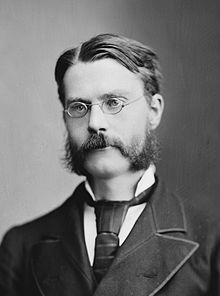Edward S. Holden
| Edward S. Holden | |
|---|---|

Edward Singleton Holden sometime between 1870 and 1880.
|
|
| Born |
November 5, 1846 St. Louis, Missouri |
| Died | March 16, 1914 (aged 67) West Point, New York |
| Nationality | American |
| Alma mater | Washington University in St. Louis, B.S. degree; West Point, class of 1870 |
| Occupation | Astronomer, university president, professor of mathematics, librarian |
| Employer | US Naval Observatory, Washburn Observatory at the University of Wisconsin–Madison, Lick Observatory, University of California, United States Military Academy |
| Organization | Astronomical Society of the Pacific |
| Known for | Fifth president of the University of California; discovered 22 NGC objects |
| Parent(s) | Jeremiah and Sarah Holden |
| Relatives | Cousin George Phillips Bond, grandson, inventor Edward Singleton Holden |
| Awards | Member, National Academy of Sciences |
Edward Singleton Holden (November 5, 1846 – March 16, 1914) was an American astronomer and the fifth president of the University of California.
He was born in St. Louis, Missouri, in 1846 to Jeremiah and Sarah Holden. From 1862–66, he attended Washington University in St. Louis, where he obtained a B.S. degree. He later trained at West Point in the class of 1870.
In 1873 he became professor of mathematics at the US Naval Observatory, where he made a favorable impression on Simon Newcomb. On August 28, 1877, a few days after Asaph Hall discovered the moons of Mars Deimos and Phobos, he claimed to have found a third satellite of Mars. Further analysis showed large mistakes in his observations. He was director of Washburn Observatory at the University of Wisconsin–Madison from 1881 to 1885. He was elected a member of the American National Academy of Sciences in 1885. He discovered a total of 22 NGC objects during his work at Washburn Observatory.
He was president of the University of California from 1885 until 1888, and the first director of the Lick Observatory from 1888 until the end of 1897. He resigned as a result of internal dissent over his management among his subordinates. While at the Lick Observatory, he was the founder of the Astronomical Society of the Pacific and its first president (1889–1891).
...
Wikipedia
